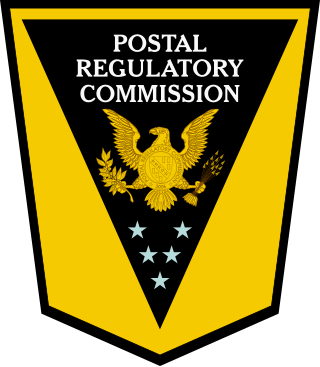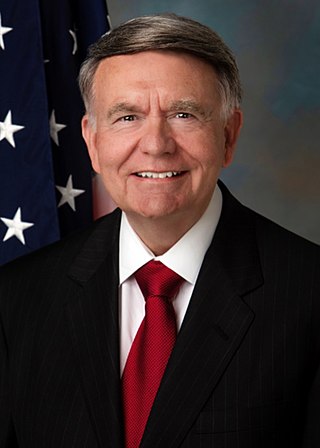
The United States postmaster general (PMG) is the chief executive officer of the United States Postal Service (USPS). The PMG is responsible for managing and directing the day-to-day operations of the agency.

The United States Postal Service (USPS),also known as the Post Office,U.S. Mail,or simply the Postal Service,is an independent agency of the executive branch of the United States federal government responsible for providing postal service in the United States,its insular areas and associated states. It is one of a few government agencies explicitly authorized by the Constitution of the United States. As of 2023,the USPS has 525,469 career employees and 114,623 non-career employees.

A ZIP Code is a system of postal codes used by the United States Postal Service (USPS). The term ZIP was chosen to suggest that the mail travels more efficiently and quickly when senders use the code in the postal address. The Philippine Postal Corporation also uses this terminology for the postal code system in the Philippines.
Canada Post Corporation,trading as Canada Post,is a Canadian Crown corporation that functions as the primary postal operator in Canada.
The Board of Governors of the United States Postal Service is the governing body of the United States Postal Service (USPS). The board oversees the activities of the Postal Service,while the postmaster general actively manages its day-to-day operations.

The United States Postal Inspection Service (USPIS),or the Postal Inspectors,is the federal law enforcement arm of the United States Postal Service. It supports and protects the U.S. Postal Service,its employees,infrastructure,and customers by enforcing the laws that defend the United States' mail system from illegal or dangerous use. Its jurisdiction covers any crimes that may adversely affect or fraudulently use the U.S. Mail,the postal system,or postal employees. With roots going back to the late 18th century,the USPIS is the country's oldest continuously operating federal law enforcement agency.

The United States Postal Regulatory Commission,formerly called the Postal Rate Commission,is an independent regulatory agency created by the Postal Reorganization Act of 1970. Like the Postal Service,it was defined in law as an independent establishment of the executive branch.

Robert Michael Duncan is an American politician. A member of the Republican Party,he served as the chairman of the Republican National Committee from 2007 to 2009. Throughout his career,he has served on the boards of a variety of public- and private-sector organizations. Duncan was chairman,president,and CEO of Inez Deposit Bank in Inez,Kentucky,which merged with First State Bank in February 2021. He is a member of the Board of Governors of the U.S. Postal Service and previously served as its chairman.
Benjamin Franklin Bailar was an American businessman who served as the United States Postmaster General from February 16,1975,to March 15,1978. He took office on February 16,1975,succeeding Elmer T. Klassen. Previously,he had served as senior assistant postmaster general,chief financial officer,and deputy postmaster general.

William J. Henderson served as the United States Postmaster General from 1998 to 2001.

The National Rural Letter Carriers' Association (NRLCA) is an American labor union that represents the rural letter carriers of the United States Postal Service (USPS). The NRLCA negotiates all labor agreements for the rural carrier craft with the USPS,including salaries,and represents members of the rural carrier craft in the grievance procedure. The NRLCA's stated goal is to "improve the methods used by rural letter carriers,to benefit their conditions of labor with the United States Postal Service,and to promote a fraternal spirit among its members."
A Delivery Bar Code Sorter (DBCS) is a mail sorting machine used primarily by the United States Postal Service. Introduced in 1990,these machines sort letters at a rate of approximately 36,000 pieces per hour,with a 99% accuracy rate. A computer scans the addresses of the mail,and sorts it to one of up to 286 pockets,setting it up for delivery by the letter carrier.

Patrick R. Donahoe is an American politician who served as the 73rd United States postmaster general,having been appointed to the post on October 25,2010. A 35-year veteran of the Postal Service,he reported to the Postal Service Board of Governors.
E-COM,short for Electronic Computer Originated Mail,was a hybrid mail process used from 1982 to 1985 by the U.S. Postal Service (USPS) to print electronically originated mail,and deliver it in envelopes to customers within two days of transmission.
Mail Isolation Control and Tracking (MICT) is an imaging system employed by the United States Postal Service (USPS) that takes photographs of the exterior of every piece of mail that is processed in the United States. The Postmaster General has stated that the system is primarily used for mail sorting,though it also enables the USPS to retroactively track mail correspondence at the request of law enforcement. It was created in the aftermath of the 2001 anthrax attacks that killed five people,including two postal workers. The automated mail tracking program was created so that the Postal Service could more easily track hazardous substances and keep people safe,according to U.S. Postmaster General Patrick R. Donahoe.

Megan Jane Brennan served as the seventy-fourth postmaster general of the United States. Brennan became the first woman to hold the office when she assumed the position on February 1,2015.

Jeanette P. Dwyer is a former President And current national board member of the National Rural Letter Carriers' Association. When she was elected president in 2011,she became the first female president of a labor union in the history of the United States Postal Service. She served as NRLCA president until 2018,when she chose not to run for reelection. She was reappointed to the national board to fill the remainder of Executive Committeeman Johnny Miller's unexpired term on November 21,2020. Dwyer was re-elected to the board at the 116th national convention in Orlando,Florida on September 9,2022.

Louis DeJoy is an American businessman serving as the 75th U.S. postmaster general. He was appointed in May 2020 by the Board of Governors of the United States Postal Service (USPS). Prior to the appointment,he was the founder and CEO of the logistics and freight company New Breed Logistics and was a major Republican Party donor and fundraiser for Donald Trump. DeJoy is the first postmaster general since 1992 without any previous experience in the USPS and the first postmaster general in U.S. history to come directly from the board of a privately owned competitor to the public–private partnership of the USPS entity. His companies still hold active service contracts with the USPS,generating controversy over conflict of interest.
The 2020 United States Postal Service crisis was a series of events that caused backlogs and delays in the delivery of mail by the United States Postal Service (USPS). The crisis stems primarily from changes implemented by Postmaster General Louis DeJoy shortly after taking office in June 2020. The delays have had substantial legal,political,economic,and health repercussions.

The Postal Service Reform Act of 2022 is a federal statute intended to address "the finances and operations of the U.S. Postal Service (USPS)",specifically to lift budget requirements imposed on the Service by the Postal Accountability and Enhancement Act and require it to continue six-day-a-week delivery of mail.
















